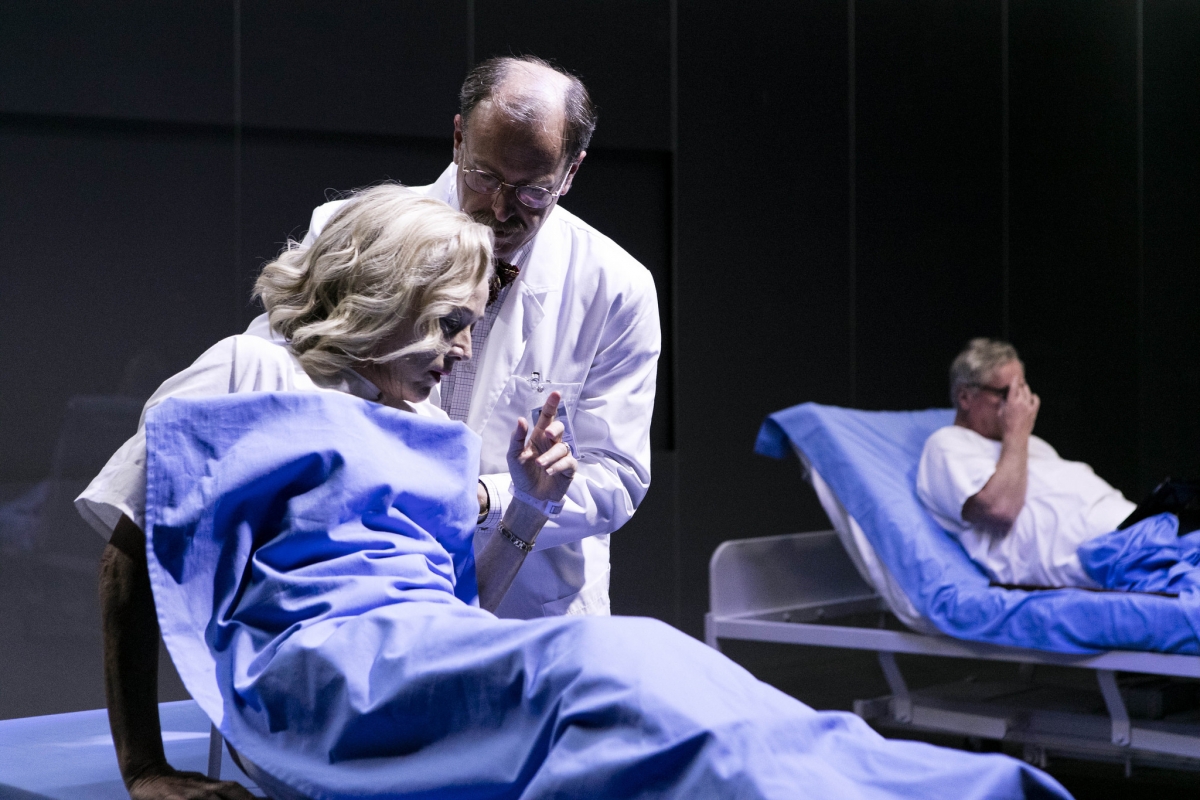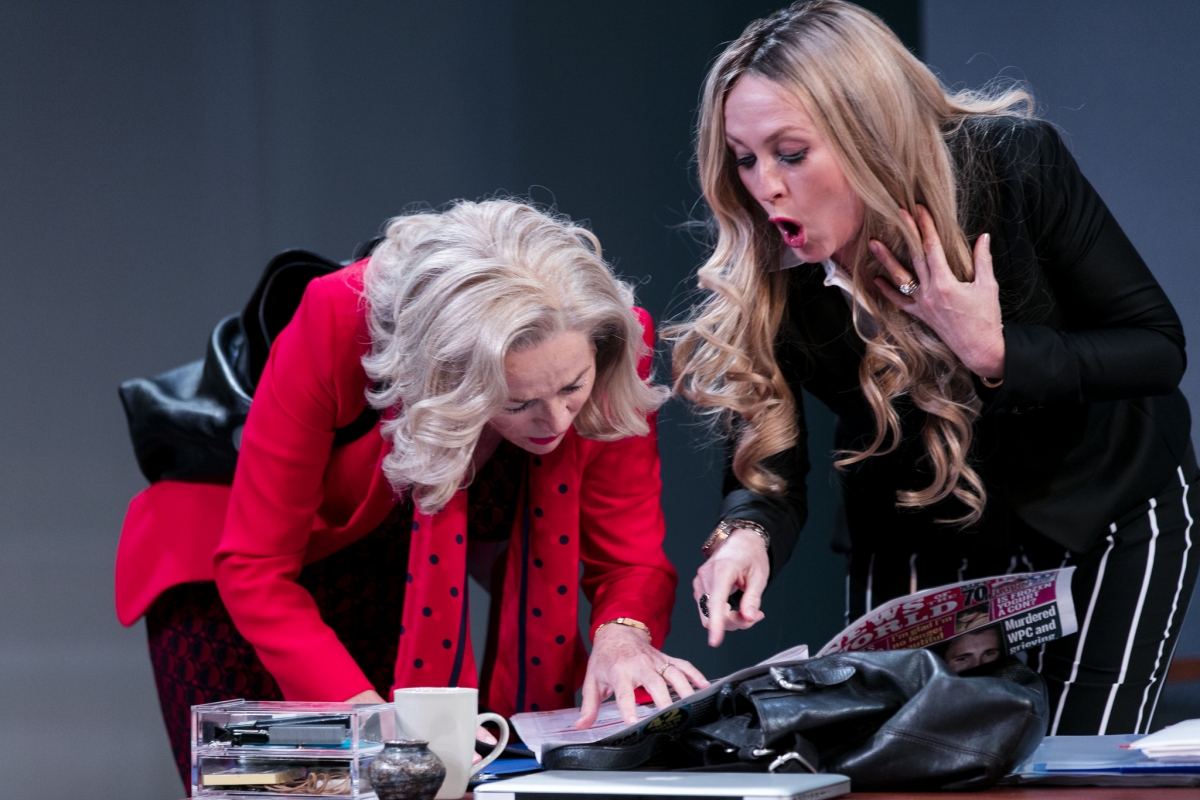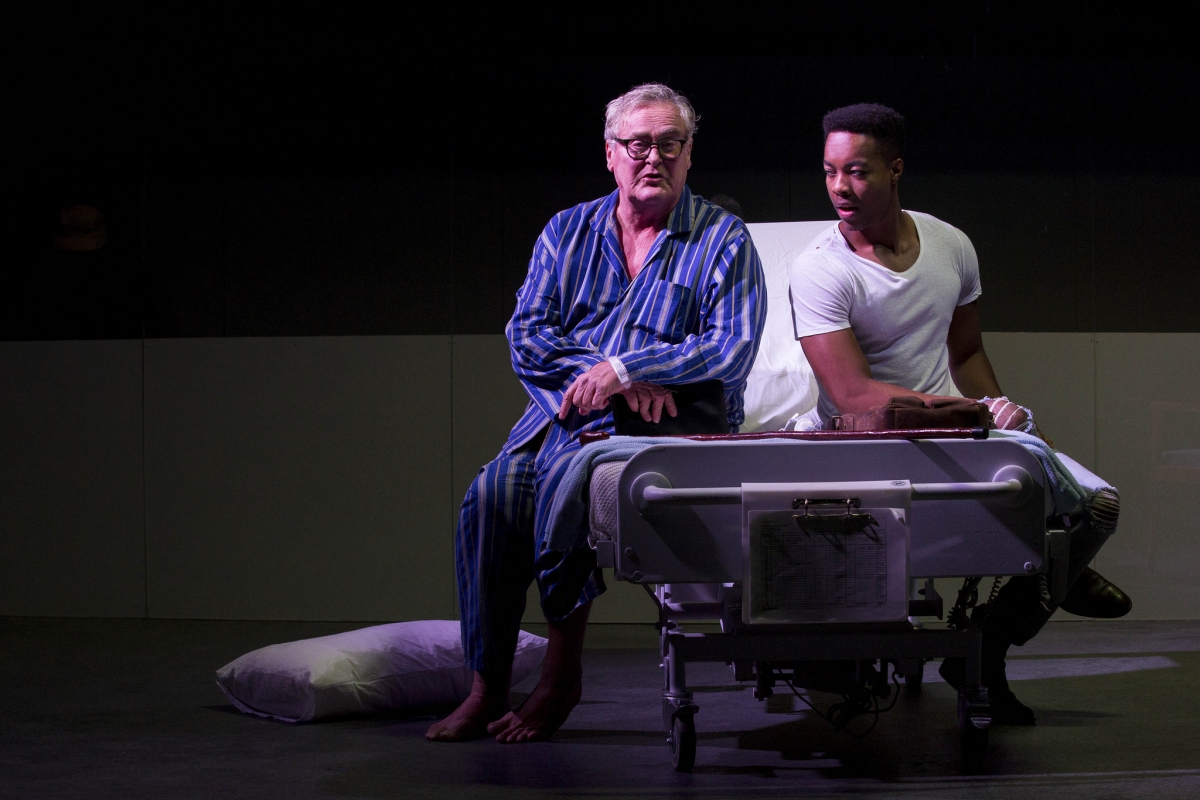It really is an extraordinary true story, and to have its main protagonists – Mark Colvin and Mary-Ellen Field who donated one of her kidneys to him – in the opening night audience added an extra frisson and emotion to the premiere of the new Australian play Mark Colvin’s Kidney. But whether the play transcends its narrative to create a compelling piece of theatre in its own right is debatable.
 Sarah Peirse, Christopher Stollery and John Howard in Mark Colvin’s Kidney. Photo © Brett Boardman
Sarah Peirse, Christopher Stollery and John Howard in Mark Colvin’s Kidney. Photo © Brett Boardman
In a nutshell, for anyone who isn’t aware of the background to the piece, Field is an expat Australian intellectual property expert who was working for supermodel Elle Macpherson in London, when details of Macpherson’s private life appeared in the British tabloids in 2005. Suspecting Field of leaking the information, Macpherson forced her to go to a rehab centre in Arizona, even though she had never been an alcoholic, and then sacked her.
Field’s health, reputation and career took a severe battering. Eventually, it became clear that she was innocent and that Macpherson’s mobile had been hacked by reporters from the now defunct News of the World. Even then, Field – who was determined that her case come to court – was hounded by the press, and Macpherson never apologised.
Colvin, a highly-esteemed ABC radio journalist, first interviewed Field about the British celebrity phone hacking scandal in 2011 and gradually they developed a friendship over the phone and Twitter. Colvin was on dialysis and in dire need of a new kidney, having picked up a rare virus while working in Rwanda years earlier. Before they had even met face to face, Field offered him one of her kidneys. Colvin declined initially, but he eventually accepted her incredibly generous offer and had a life-saving transplant in 2012.
 Sarah Peirse with Helen Thomson as Elle Macpherson. Photograph © Brett Boardman
Sarah Peirse with Helen Thomson as Elle Macpherson. Photograph © Brett Boardman
Tommy Murphy tells their story in his play Mark Colvin’s Kidney. He interviewed Field and Colvin at length, as well as various other people who were involved along the way. It’s certainly an incredible tale, crossing hemispheres and decades and encompassing the best and worst of human behaviour.
The play is perfectly enjoyable on that level. But it never really feels that it is anything more than a faithfully told narrative. There are so many interesting themes and ideas embedded in the story – the nature of altruism and justice, and the integrity (or lack of it) of the press, for starters. As director David Berthold has pointed out, it’s ironic that Field was treated so appallingly by the media and yet chose to donate her kidney to a journalist. Yet none of the themes really resonate strongly.
Murphy certainly manages to tell the story clearly but he hasn’t corralled all the information into an inherently dramatic shape. It feels as if the play unfolds on one level, for the most part, while sketchy scenes of Colvin working overseas sit a little oddly. And at the end of the play, we’re still not really sure why Field chose to donate a kidney to Colvin. That said, there are some lovely little moments, some delightful flashes of humour, and when Colvin is finally able to accept Field’s extraordinary gift, it is very moving.
Michael Hankin’s open set with its reflective glass walls and large back window creates a flexible space, which Berthold uses cleverly to keep scenes flowing seamlessly into each other. Projected surtitles locating the action, and footage from around the time of the Leveson Inquiry work well.
 John Howard and Kit Esuruoso. Photograph © Brett Boardman
John Howard and Kit Esuruoso. Photograph © Brett Boardman
The characters of Colvin and Field are both convincingly observed and warmly portrayed by John Howard and Sarah Peirse – though both struggled a little with the dialogue on opening night, with slight hesitations and stumbles from Peirse in particular. But once the play settles in, the roles are in very safe hands. Peirse brings a feisty wit and energy that propels the play, and Howard eloquently expresses wells of emotion beneath the surface and captures Colvin’s way of speaking.
The supporting cast of four play more than 25 roles between them. Christopher Stollery moves with impressive ease between several distinctly drawn characters including the surgeon who does the transplant and Field’s British lawyer. Peter Carroll is also excellent as Field’s loyal but bemused husband Bruce and positively creepy as a sex offender at the rehab centre. Kit Esuroso is moving as Colvin’s son William, and while Helen Thomson doesn’t completely nail Elle Macpherson she too moves adeptly between various characters.
All in all, even if the way it’s told doesn’t make for entirely compelling theatre, it’s a fascinating and ultimately uplifting story.
Mark Colvin’s Kidney plays at Belvoir St Theatre until April 2











Comments
Log in to join the conversation.